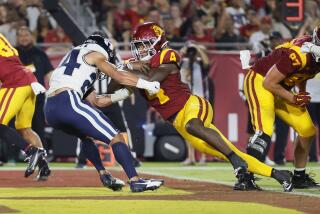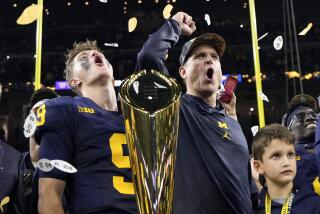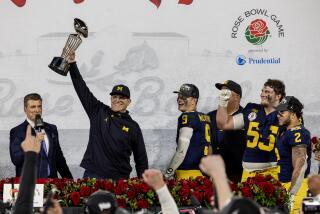Humans Have Bigger BCS Role
- Share via
NEW YORK — The folks who run the Bowl Championship Series are still trying to get it right: Pick the most deserving teams to play in its title game and stop infuriating so many college football fans.
Last year, the BCS’ six-year-old computer-biased formula left USC out of a national title game even though the Trojans were No. 1 in both the Associated Press media and coaches’ polls.
That created the BCS’ worst nightmare -- split national champions. USC clinched the AP title by beating Michigan in the Rose Bowl, and LSU won the coaches’ crown by defeating the BCS’ No. 1 team, Oklahoma, in the Sugar Bowl.
And just like the last time there were co-champions, when the 1997 crown was shared by Michigan (AP) and Nebraska (coaches) and the Bowl Alliance was ditched -- the conference honchos sacked their system and went for another overhaul.
This year, it’s up with people and down with the utterly confusing mix of calculations that included strength of schedule, won-loss records and quality wins.
The AP media poll and the USA Today/ESPN coaches poll will each count for one-third of a team’s BCS ranking; computers will count for the other third. Before, the human polls combined made up just one-quarter of the ranking.
“This will be easier to understand, much more accurate and will serve us better,” Pacific-10 Conference Commissioner Tom Hansen said. “Will we get into trouble again? Probably.”
Hansen has seen his league left on the outside looking in for two of the last three BCS title games. The Trojans finished third in the final BCS rankings last year, and Pac-10 champion Oregon was edged out of the 2001 title game by Nebraska, which was trounced by Colorado in its final regular season game.
“It’s a better formula, it’s simpler and I think it’s got all the components,” Southeastern Conference Commissioner Mike Slive said. “There’s nothing perfect about it, just as there’s nothing perfect about the human polls.”
What the BCS has done is simply shift the weight of responsibility from computers to people. Now, the polls count for two-thirds. Before the BCS, college football relied almost exclusively on the media and coaches polls to determine bowl matchups.
All 11 Division I-A conference commissioners and Notre Dame were involved in the process that changed the formula.
Longtime AP poll voter Tony Barnhart of the Atlanta Journal-Constitution says the changes are good -- and bad.
“It simplifies things for the fans, and if something goes wrong they’ll know who to blame,” he said. “And that’s the bad part, they’ll know exactly who to blame.”
Ballots of AP voters are made available; the coaches’ ballots are not released.
Grant Teaff, executive director of the American Football Coaches Association, says 88 of the 117 Division I-A coaches are against having their ballots made public. Teaff said opponents might gain an edge if they knew what a coach thought about them before a game.
Teaff is more concerned with avoiding last year’s embarrassment, when USC -- the coaches’ No. 1 pick -- didn’t make the title game. Coaches who vote are obligated to name the winner of the BCS title game the national champion. Writers in the AP poll are under no such obligation.
“The important thing for us is we never want what happened last year to happen again,” he said.
The new system lessens the chance of a repeat, but it doesn’t eliminate it. But what happens if three teams finish the regular season undefeated, or one team is unbeaten and there are two or three once-beatens, or there are three once-beaten teams?
“We generated some interest in tweaking the system and trying to find a better way,” USC Coach Pete Carroll said. “Whether it is a better way or not, we’ll just have to wait and see how it works. Without a playoff system, there’s always going to be some kind of a formula, so there’s going to be scrutiny about the selection process.”
Had the new system been in place last year, USC and LSU would have played in the title game, and in 2001 Miami would have played Oregon instead of Nebraska. In 2000, Miami still would have been left out of the game that matched Oklahoma against Florida State despite handing the Seminoles their only loss of the season.
In the other three years of the BCS format, there were true title games: Tennessee beat Florida State for the 1998 championship, Florida State beat Virginia Tech in 1999, and Ohio State beat Miami for the 2002 title.
Under the new system, a team will have a percentage score for each of three components. These percentages will be averaged to determine a team’s BCS ranking. For both the AP and coaches’ polls, the total points received in the balloting divided by the maximum points possible will yield the percentage.
Six computer rankings are in the mix: Jeff Sagarin, Anderson & Hester, Richard Billingsley, Colley Matrix, Kenneth Massey and Dr. Peter Wolfe. The highest and lowest ranking will be tossed out each week. The poll average will be figured based on 25 points for first, 24 for second, and so forth. The scores will be averaged and the total calculated as a percentage of 100.
The percentages will be added and divided by three to come up with the team’s BCS ranking.
For example, if Team X receives 1,760 of 1,800 points from the AP poll, its percentage would be .978; with 1,440 out of 1,500 in the coaches poll, its percentage would be .960; and with 94 of a possible 100 points from the computers, its percentage would be .940 for a BCS average of .959.
“It was apparent to us that just using the average rankings of the polls was not an adequate comparison of the level of voting support for each team,” BCS coordinator and Big 12 commissioner Kevin Weiberg said. “A top-ranked team could be one point ahead of the second-ranked team, or it could be 200 points ahead. Using the actual voting points in the formula allows for a more accurate ranking in the BCS poll. This is especially important when there is marginal separation between a No. 2 and No. 3 team.”
Of course, things could change after the 2005 season, when the BCS contract expires. Beginning in 2006, a fifth game will be added to the BCS, with the championship game played a week later at the site of one of the BCS bowls.
Stay tuned. The first BCS rankings are tentatively scheduled for Oct. 18.
More to Read
Go beyond the scoreboard
Get the latest on L.A.'s teams in the daily Sports Report newsletter.
You may occasionally receive promotional content from the Los Angeles Times.










